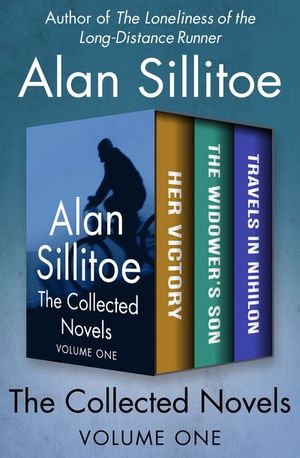The Collected Novels Volume One
Published by Open Road Media
These memorable novels show the range of the bestselling author of The Loneliness of the Long-Distance Runner, “one of the best English writers” (The New York Times).
British novelist Alan Sillitoe “powerfully depicted revolt against authority by the young and working class” in his best-known works of fiction (The Washington Post). Both The Loneliness of the Long-Distance Runner and Saturday Night and Sunday Morning were international bestsellers and made into acclaimed films. The prolific, award-winning author wrote over fifty books, including the three novels collected in this volume: a hard-won love story, a father-son tale of love and war, and a dystopian satire.
Her Victory: Finally leaving her brutish husband, Pam flees to London, where she takes refuge in a lonely, sparsely furnished room. With a twist of the wrist, she turns on the gas and resigns herself to death, only to be saved by a neighbor, Tom, a former sailor in the Merchant Navy, who carries scars of his own. Both fighting despair, these two unlikely lovers attempt to begin a new life together and find a reason to go on.
“Engrossing . . . Interesting and affecting.” —The New York Times
The Widower’s Son: Leaving the coal mines for the army, Charlie Scorton never looked back. After his wife died, the career military man raised his son to be a soldier as well. Like his father, William finds a home in the army, performing heroically at Dunkirk. But soon he will be forced to answer the question his father never could: What does a soldier do when war is over?
“Earnest, tenacious . . . Sillitoe retains his commendable honesty.” —Kirkus Reviews
Travels in Nihilon: In Sillitoe’s biting satirical novel, Nihilon is a country where honesty is outlawed, drunk driving is mandatory, and nihilism reigns supreme. Five researchers are sent into the midst of this chaos to compile a new guidebook about the peculiar, unexplored land and its all-powerful leader, President Nil. They arrive as tourists, but they’ll soon find out it’s a lot easier to enter Nihilon than it is to escape.
“Diabolically witty.” —The New York Times
British novelist Alan Sillitoe “powerfully depicted revolt against authority by the young and working class” in his best-known works of fiction (The Washington Post). Both The Loneliness of the Long-Distance Runner and Saturday Night and Sunday Morning were international bestsellers and made into acclaimed films. The prolific, award-winning author wrote over fifty books, including the three novels collected in this volume: a hard-won love story, a father-son tale of love and war, and a dystopian satire.
Her Victory: Finally leaving her brutish husband, Pam flees to London, where she takes refuge in a lonely, sparsely furnished room. With a twist of the wrist, she turns on the gas and resigns herself to death, only to be saved by a neighbor, Tom, a former sailor in the Merchant Navy, who carries scars of his own. Both fighting despair, these two unlikely lovers attempt to begin a new life together and find a reason to go on.
“Engrossing . . . Interesting and affecting.” —The New York Times
The Widower’s Son: Leaving the coal mines for the army, Charlie Scorton never looked back. After his wife died, the career military man raised his son to be a soldier as well. Like his father, William finds a home in the army, performing heroically at Dunkirk. But soon he will be forced to answer the question his father never could: What does a soldier do when war is over?
“Earnest, tenacious . . . Sillitoe retains his commendable honesty.” —Kirkus Reviews
Travels in Nihilon: In Sillitoe’s biting satirical novel, Nihilon is a country where honesty is outlawed, drunk driving is mandatory, and nihilism reigns supreme. Five researchers are sent into the midst of this chaos to compile a new guidebook about the peculiar, unexplored land and its all-powerful leader, President Nil. They arrive as tourists, but they’ll soon find out it’s a lot easier to enter Nihilon than it is to escape.
“Diabolically witty.” —The New York Times
BUY NOW FROM
COMMUNITY REVIEWS

